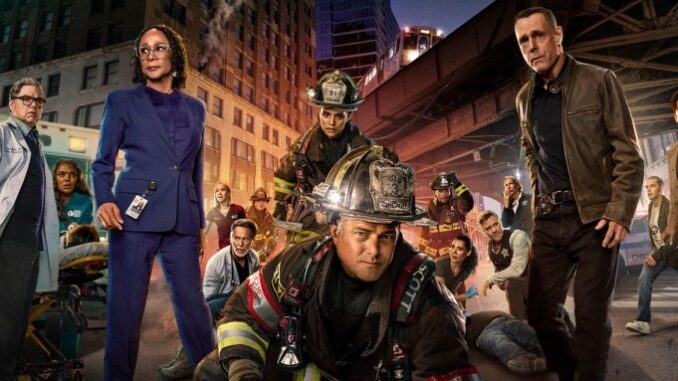
The Ember and the Phoenix: One Chicago 2025 and the Epic Return of the NBC Universe
The year 2025 dawns not with a whimper, but with the clarion call of a firehouse bell. In the heart of the Windy City, a familiar warmth, born of courage and camaraderie, begins to spread, igniting a grander narrative across the television landscape. “One Chicago 2025” is more than just a tagline; it’s a promise, a re-affirmation, and a declaration: the NBC Universe is back, and Chicago Fire, the unwavering ember that sparked it all, stands poised to lead its epic return.
Imagine the crisp Chicago air of a late autumn morning. The familiar roar of Engine 51 and Truck 81 tearing down Michigan Avenue isn’t just responding to a five-alarm blaze; it’s the opening chord of a symphony. The smoke-stained faces of Kelly Severide, Stella Kidd, and the venerable Christopher Herrmann are not merely saving lives; they are the heartbeats of a city, a shared universe, preparing for a seismic shift. For years, Chicago Fire has been the anchor, the foundational story of everyday heroism, of found family, of grit and sacrifice that resonates with an authenticity rarely seen on screen. Its red-hot core, the firehouse, is more than a building; it’s a sanctuary, a crucible where character is forged and loyalty is absolute. It is this undeniable, visceral humanity that makes it the natural leader for this sprawling resurgence.
By 2025, the established rhythm of Chicago PD‘s urgent sirens and Chicago Med‘s frantic ER beeps will have woven an intricate urban tapestry. But the “Epic Return of the NBC Universe” suggests something far grander, a narrative gravitational pull that transcends the borders of the city. Envision a crisis so profound, so multi-faceted, that it demands the collective might of every corner of the NBC pantheon. Perhaps a network of organized crime, not just confined to Chicago, but with tentacles reaching into New York’s Law & Order precinct. Or a national health emergency, a virulent outbreak that taxes Med‘s resources to their breaking point, requiring the inter-state collaboration seen in more expansive, cinematic universes.
The beauty of Chicago Fire leading this charge lies in its inherent metaphor: fire cleanses, transforms, and illuminates. It’s a primal force that demands attention, respect, and immediate action. As the firefighters face literal infernos, they represent the metaphorical fires that threaten society – crime, disease, injustice. When Severide’s squad hacks through a collapsed building, or Kidd commands her truck through a blinding blizzard, their actions are microcosms of the larger struggle. They are the first responders, the ones who rush in when everyone else runs out, embodying the courage and selflessness that forms the bedrock of every heroic narrative within the NBC family.
This “epic return” isn’t merely about crossovers; it’s about a re-commitment to a shared storytelling ethos. It’s about characters from diverse worlds – the stoic detectives of the 21st District, the compassionate doctors of Gaffney, the sharp legal minds of the prosecutor’s office, and the unyielding firefighters of Firehouse 51 – finding common ground against a common threat. It’s the realization that while their methods differ, their ultimate goal – to protect, to serve, to heal, to save – is universally aligned.
One Chicago 2025, with Chicago Fire as its blazing vanguard, promises more than just interconnected episodes. It heralds a renewed era of immersive storytelling, where the stakes are higher, the canvas is broader, and the human spirit, in all its resilient, flawed glory, shines brightest. It’s the phoenix rising from the embers, a testament to the enduring power of grounded, character-driven drama, reminding us that even in the vastness of a universe, the spark of a single ember can illuminate the path home. The bell has rung. The universe is waiting. And Chicago, as always, is ready to lead.
